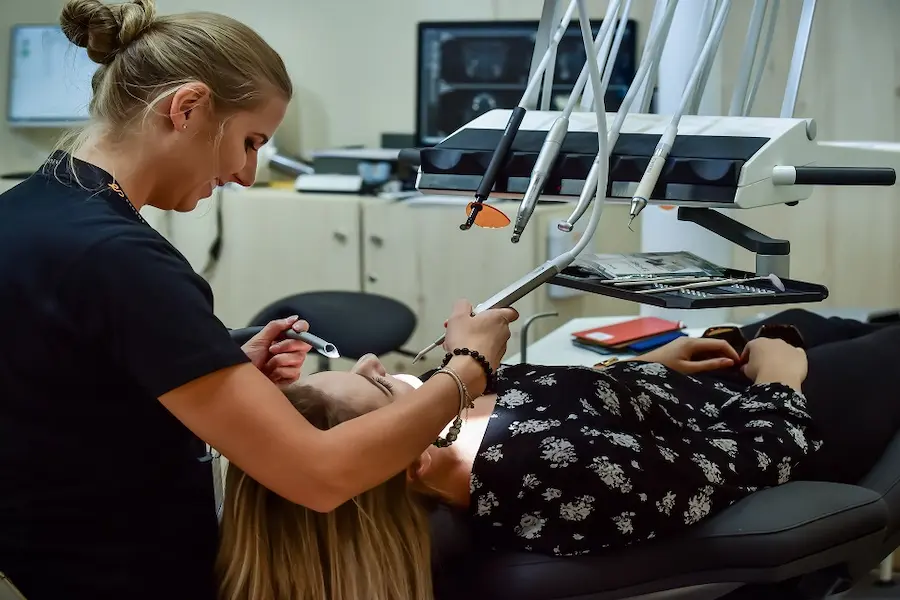Many people don’t look forward to their next visit to the dentist. This is particularly common among patients with professional cleaning appointments. The anxiety and fears are understandable, as many aren’t comfortable with sharp equipment, whirring noises and occasional discomfort. Nonetheless, cleaning is vital to maintaining proper oral health.
Table of Contents
What is Professional Tooth Cleaning?
Professional cleaning is a preventative procedure aimed at achieving optimal oral health. It involves removing accumulated plaque and tartar to restore your teeth’s colour and functionality. Keeping your teeth clean lowers the risk of cavities, tooth discolouration, decay, and other dental complications.
Although you can maintain oral health by brushing and flossing regularly, you still need professional cleaning because it’s more thorough. Domestic oral hygiene habits like brushing and flossing are helpful, but they can’t remove stubborn plaque and tartar, increasing susceptibility to dental complications.
Why Is It Necessary?
Here are the top reasons to get your teeth cleaned every six months.
- Maintaining optimal oral health – the primary reason for tooth cleaning is to keep your teeth and gums healthy.
- Preventing discolouration – poor habits like drinking caffeinated drinks and smoking cause discolouration, which is reversible by cleaning.
- Preventing cavities and other dental complications – removing plaque and tartar slows down bacterial growth, reducing the risk of cavities, decay and tooth loss.
How it Works
Here’s what happens when you go for professional teeth cleaning.
Oral Examination
The dentist examines your oral cavity using a small mirror. If you don’t have any serious issues, they proceed to the next step. Otherwise, they solve the problem and assess your suitability for cleaning.
Plaque and Tartar Removal
As mentioned earlier, brushing and flossing will only remove a portion of the plaque on your teeth. Some remains, especially in hard-to-reach areas like between your teeth. When this plaque stays for a long, it hardens into tartar.
A dentist has the knowledge and equipment needed to remove plaque and tartar. Prodding tools can reach areas that your toothbrush and dental floss can’t. They also have scalers for removing stubborn stains from your teeth’s surface.
Teeth Polishing
After removing plaque and tartar, the dentist polishes your teeth to make them whiter and shinier. Then, they use a high-powered brush to remove stains from the enamel and restore whiteness. The brush is usually noisy but painless.
Rinsing
The last step in professional cleaning is rinsing. The dentist drizzles water into your mouth and asks you to gurgle. Rinsing removes residual tooth polish and other unwanted materials from your oral cavity.
Potential Complications and Risks
Professional teeth cleaning is painless. The only discomfort a patient experiences is keeping their mouth open throughout the procedure. This discomfort is pronounced in patients with extensive plaque and tartar accumulation. Usually, hardened tartar requires multiple sessions to eliminate.
Like other invasive procedures, professional teeth cleaning has its risks. If the dentist applies too much force or uses improper equipment, the patient might get an injury to the gums, causing bleeding. Severe cuts leave open wounds, increasing susceptibility to infections.
In addition, the injuries might cause swelling, chewing discomfort and problems with speech. Sometimes, the patient might lose teeth.
Therefore, it is important to get help from a registered dentist with relevant experience to prevent such risks. Ask your friends and family before scheduling a cleaning appointment.
FAQs About Professional Tooth Cleaning
- How Long Does It Take?
A typical cleaning session lasts between 30 minutes and one hour. However, it may take longer for patients with extensive plaque and tartar buildup.
- How often Should You Do It?
Dentists recommend cleaning your teeth every six months or twice yearly.
- Is it Worth It?
Yes, cleaning keeps your teeth healthy and prevents tooth damage.
Wrapping Up
It isn’t easy to attain a sparkling white smile. Besides regular brushing and flossing, you must visit your dentist every six months for professional cleaning. It’s a painless procedure that costs a few dollars and prevents severe dental complications.
Read also: Why you Should See a Dentist for Regular Teeth Cleaning

